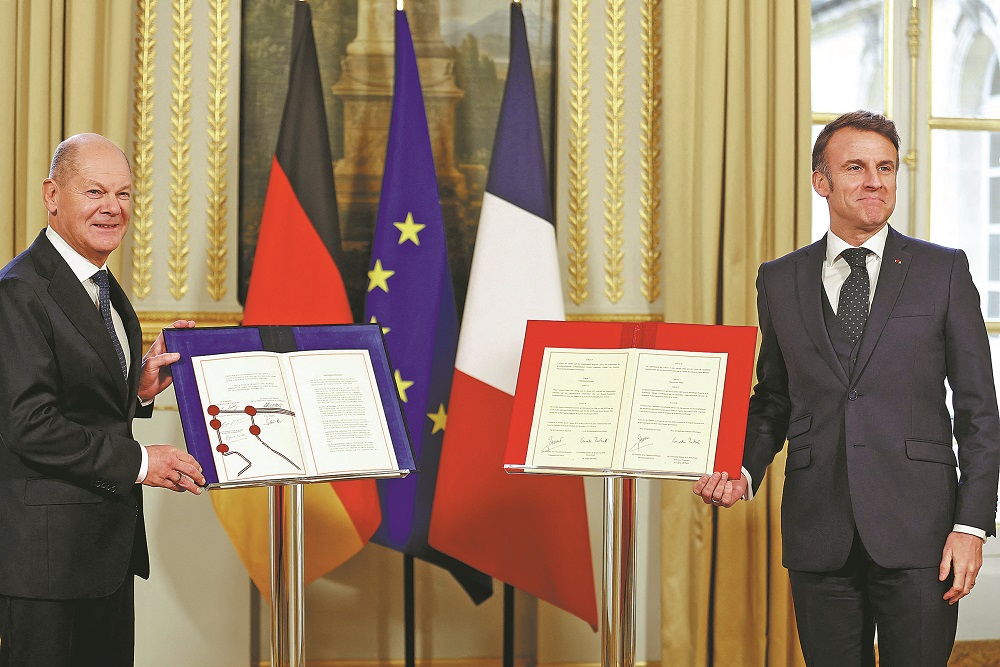
French President Emmanuel Macron (right) and German Chancellor Olaf Scholz pose next to the Aix-la-Chapelle and Elysee agreements after their meeting at the Elysee Presidential Palace in Paris, on Wednesday. MOHAMMED BADRA/AFP
PARIS — The leaders of France and Germany agree that both countries must act for a "strong" Europe, French President Emmanuel Macron said after meeting German Chancellor Olaf Scholz in Paris.
At a joint news briefing with Macron at the Elysee palace two days after US President Donald Trump took office, Scholz said the new US leader "will be, and so much is already clear, a challenge".
He added, "Europe will not cower and hide, but instead be a constructive and assertive partner."
This stance, Scholz said, will be "the basis for good cooperation with the new American president".
Europe and US are linked by "a long history of friendship and partnership", which he called "a stable foundation" for future relations.
Trump had already announced a number of policy measures "which we will, of course, analyze in detail together with our European partners", Scholz said.
The meeting between the two leaders came on the 62nd anniversary of the Elysee Treaty, a framework for France-Germany bilateral relations after World War II.
"Our couple is solid," said Macron.
Macron and Scholz underlined the role of their countries' close cooperation for European unity.
"Europe must be strong and resilient in a world that is, to put it mildly, in motion," said Scholz, who next month faces a general election at home.
"The only possible response for Europeans to the period that we are entering is more unity, more ambition, more audacity and more independence," Macron said. "This is our momentum, and this is the direction in which we are going."
Concerns have been raised in Germany recently over the potential impact of Trump's policy overhauls on the German economy and international trade relations.
German Vice-Chancellor and Minister of Economics Robert Habeck has warned that Germany is prepared to impose retaliatory tariffs if the United States proceeds with new import duties on German products.
Speaking at the Handelsblatt Energy Summit in Berlin on Tuesday, Habeck emphasized the need for an independent approach to US trade relations under the Trump administration.
Habeck said Germany should approach the new US government with "an outstretched hand" but not allow the hand to be "slapped away without limits." "We should not crawl in submissiveness," he added.
Trump, in his second term, has intensified pressure on key trading partners, reassessing global trade relationships. While threats of new tariffs have been issued, no formal measures have yet been introduced.
Marcel Fratzscher, president of the German Institute for Economic Research, or DIW Berlin, highlighted that Trump's trade policies could deliver a "triple hit" to Germany: falling exports, a further slowdown in industry, and job losses.
Challenges of recovery
"The German economy has already contracted for two consecutive years, and trade tensions would exacerbate the challenges of recovery," Fratzscher said. "Trade conflicts will also push up prices and intensify inflation, particularly hurting low- and middle-income households."
Germany's automotive industry faces new challenges as Trump's tax policies could encourage more automakers to shift production to the US, said Hildegard Mueller, president of the German Association of Automotive Industry.
Mueller urged Germany and Europe to strengthen their independence and competitiveness.
She also cautioned that Trump's tariff policies could raise car prices in the US and hurt global automakers, leading to declining stock prices and worsening inflation.
"While Trump pledged to reduce inflation during his campaign, these tariffs could have the opposite effect, placing additional strain on the US economy and consumers," she added.
Moritz Schularick, president of the Kiel Institute for the World Economy, said that companies might relocate investments to the US to avoid tariffs, but this would lead to higher prices for US consumers and further inflationary pressure.
AGENCIES—XINHUA